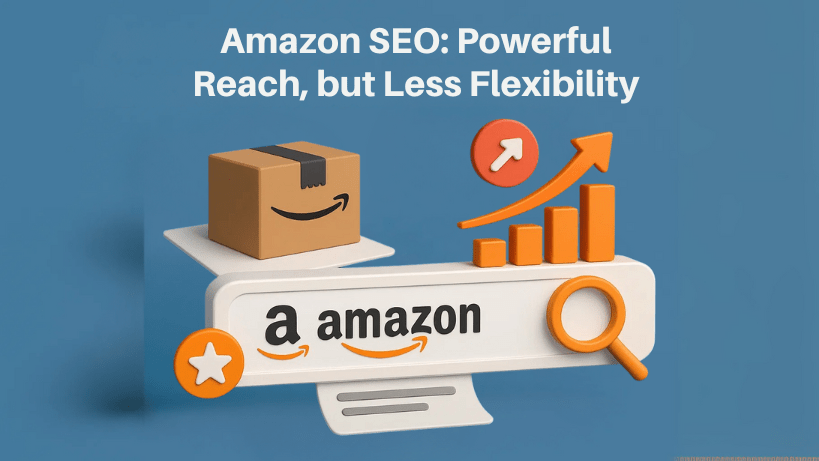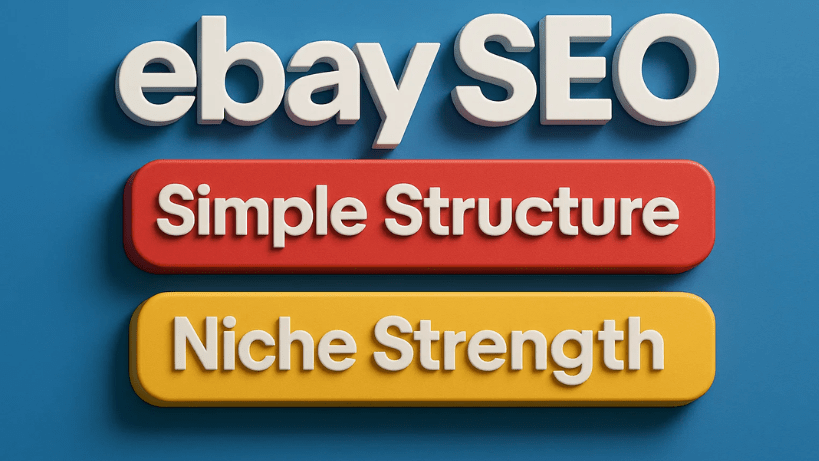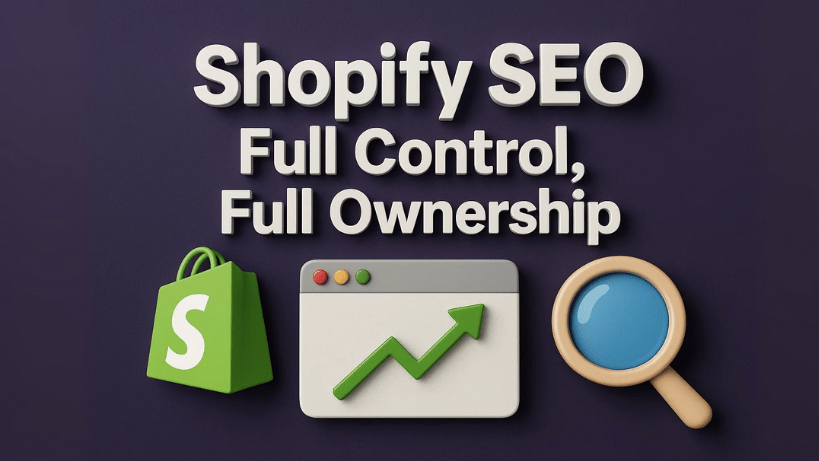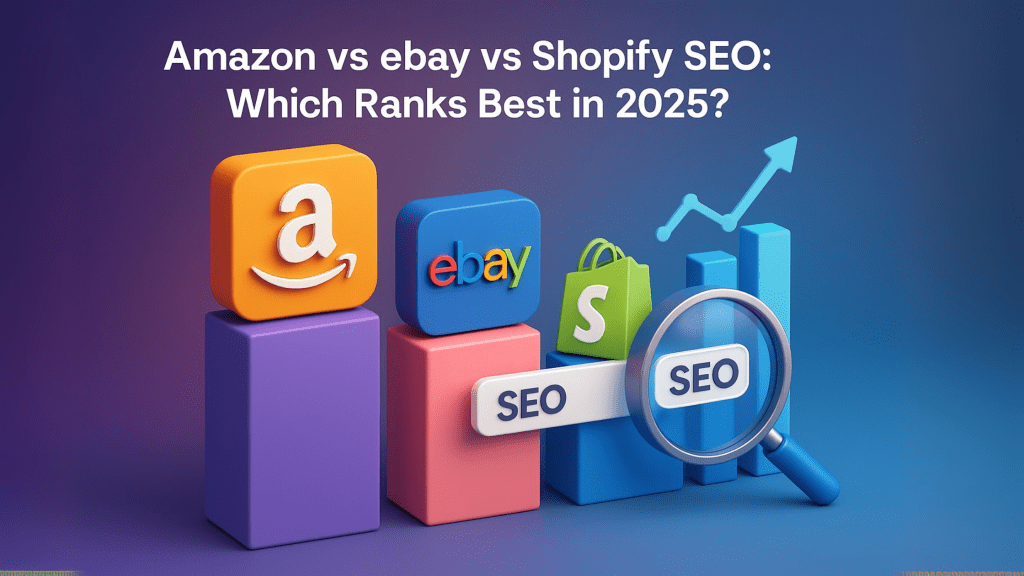If you’ve ever searched for a product online and found yourself bombarded with options from Amazon, eBay, and independent Shopify stores, you’re not alone. In fact, that’s the everyday reality for millions of online shoppers and sellers in 2025.
But here’s the thing: whether you’re selling handmade candles, tech gadgets, or custom apparel, your success largely depends on one crucial factor—how easily people can find your products online.
That’s where SEO comes into play.
Search Engine Optimization or SEO isn’t just for blogs or digital marketers anymore. It’s the secret weapon behind every successful eCommerce brand. But not all platforms treat SEO the same.
So, if you’re debating whether to sell on Amazon, eBay, or Shopify, the question you should really be asking is: Which platform gives me the best chance to rank and get found in 2025?
In this blog, we’ll compare the SEO strengths and weaknesses of Amazon, eBay, and Shopify—and help you figure out which one’s best for your online store this year. Let’s dive in.
Why SEO Still Rules in eCommerce
SEO (Search Engine Optimization) is more than just keyword stuffing or blog writing, especially in eCommerce. It’s about structuring your product listings, store pages, and backend content in a way that helps search engines like Google, Bing, or even internal algorithms like Amazon’s A9 easily find, understand, and recommend your products to buyers.
In 2025, SEO plays a key role in:
- Driving free, organic traffic to your listings
- Building long-term brand visibility
- Reducing your dependency on paid ads
- Enhancing user experience and conversion rates
With that in mind, let’s compare Amazon vs eBay vs Shopify SEO across the areas that matter most.
Amazon SEO: Powerful Reach, but Less Flexibility

Amazon is the default shopping engine for millions of Americans. In fact, over 60% of product searches in the U.S. now begin on Amazon itself.
So, What Works in Amazon SEO:
- High domain authority helps Amazon listings rank well on Google
- You can optimize your product titles, bullet points, and backend search terms
- Tools like A+ Content and Brand Stores offer more control (for brand-registered sellers)
- Voice-friendly content through Amazon Alexa integration
But while Amazon gives you an enormous audience, the SEO control it offers is limited. You’re operating on Amazon’s turf, with strict rules, limited customization, and tons of competition—including Amazon’s own private-label products.
Where It Falls Short:
- No control over technical SEO (URLs, structured data, etc.)
- No ability to build backlinks or run a blog
- Limited access to customer data and buyer journey insights
Here’s Our Verdict:
Amazon can work great for quick visibility and high-intent buyers, but you’ll sacrifice brand control and long-term SEO growth.
eBay SEO: Simple Structure, Niche Strength

eBay still holds relevance in the U.S. for vintage, collectible, and hard-to-find products. From an SEO standpoint, its structure is fairly basic, but it’s surprisingly effective for sellers in the right category.
eBay SEO Positives:
- Listings are indexed by Google, giving you external visibility
- You can optimize product titles, categories, and item specifics
- eBay has strong internal search, and product relevance is key
However, eBay’s platform hasn’t evolved much when it comes to SEO innovation. Unlike Shopify or Amazon, eBay doesn’t offer many tools for structured SEO strategies.
Drawbacks:
- No access to backend SEO features like meta tags or schema markup
- Outdated search algorithm (Cassini) lacks modern AI personalization
- Less suitable for brand-building or content marketing
Here’s Our Verdict:
eBay can work best for niche or unique sellers who want a no-frills, fast listing process. For serious SEO growth? It’s not your best bet.
Shopify SEO: Full Control, Full Ownership

If Amazon is the mall and eBay is the flea market, Shopify is your own branded storefront. And in 2025, that control is more valuable than ever.
Shopify gives you everything you need to build an SEO powerhouse from the ground up.
Shopify SEO Strengths:
- Customizable meta titles, meta descriptions, and URLs
- Full access to alt tags, headings, image optimization, and redirects
- Built-in structured data for rich snippets in Google
- Seamless integration with SEO tools and Google Analytics
- Strong blogging capability for content-driven traffic
- Fast, mobile-optimized themes for better rankings
Want to write a blog about your niche, optimize for long-tail keywords, and drive consistent organic traffic to your product pages? Shopify lets you do all of that—and more.
Challenges:
- No built-in customer base—you’ll need to work for your traffic
- SEO takes time and effort to build
- Some technical features may require plugins or expert setup
Here’s Our Verdict:
Shopify can be your best choice for long-term SEO growth, brand-building, and owning your customer journey.
Amazon vs eBay vs Shopify SEO: Side-by-Side Comparison
| SEO Feature | Amazon | eBay | Shopify |
| Organic Google visibility | Strong – Amazon pages rank well on Google due to high domain authority | Moderate – eBay listings can appear on Google, but less consistently | Excellent – Full control to optimize for Google and other search engines |
| Internal search optimization | Excellent – Optimized for Amazon’s internal A9 algorithm | Good – eBay search works well, but lacks sophistication | Self-driven – No built-in search engine; depends on your SEO strategy |
| SEO customization (tags, URLs) | Very limited – Few customizable SEO fields | Limited – Minimal access to metadata or advanced SEO settings | Full – Control over meta tags, URLs, headers, alt text, and more |
| Blogging and content marketing | Not available – No blogging or content publishing options | Not available – Content creation is not supported | Fully available – Built-in blogging, custom pages, and long-form content |
| Structured data support | Basic – Some elements available via A+ Content (for brands only) | Lacking – No structured data implementation support | Comprehensive – Supports schema markup and rich snippets |
| Voice search compatibility | High – Integrated with Alexa for voice-driven searches | Low – No voice search optimization | Moderate – Can be enhanced with apps and third-party tools |
| Control over branding | Very restricted – Branding is limited to product pages | Limited – Some store branding possible, but within eBay’s ecosystem | Full control – Customize your store’s look, feel, and messaging |
| Long-term SEO scalability | Moderate – High competition and limited control limit SEO growth | Low – Lacks long-term SEO features and scalability | High – Designed for long-term SEO strategies and content-driven growth |
SEO Trends to Watch in 2025
- AI-optimized search is shaping how Google ranks product pages—relevance, speed, and content-rich pages win.
- Mobile-first indexing is now the default—Shopify and Amazon themes lead in performance.
- Voice search SEO is on the rise—Amazon holds the edge via Alexa, but Shopify isn’t far behind.
- Content-driven SEO matters more than ever—Shopify gives you full blogging and landing page capabilities, unlike the others.
So, Which Platform Ranks Best?
- Best for quick exposure & built-in traffic: Amazon
- Best for niche or occasional sellers: eBay
- Best for full control & SEO growth in 2025: Shopify
If your long-term goal is to build a sustainable, search-driven business, Shopify is the clear winner for SEO in 2025. You own your traffic, control your content, and grow your brand without platform-imposed limits.
How Webiators Can Help You Rank Higher?
At Webiators, we help every business like yours succeed online. Whether you’re:
- Starting your first Shopify store
- Migrating from Amazon or eBay
- Or optimizing your online store for Google
Our top SEO experts can help you improve rankings, drive more traffic, and turn clicks into customers.
Explore Shopify SEO Services
Need help with Amazon or eBay optimization? Let’s talk
FAQs
Ans: In 2025, Shopify offers the best SEO capabilities among eCommerce platforms. It provides full control over meta titles, URLs, image optimization, structured data, and blogging, making it ideal for long-term organic growth. While Amazon ranks well due to its authority, it offers limited SEO control. eBay is suitable for niche sellers but lacks advanced SEO tools.
Ans: Yes, Shopify is better than Amazon for SEO if you want full control over your store’s visibility on search engines like Google. Shopify allows customization of metadata, URLs, alt text, and content marketing through blogs. Amazon relies on internal search optimization and limits how much you can influence external search engine rankings.
Ans: Yes, eBay listings can rank on Google, but their SEO performance is limited compared to Shopify or Amazon. While eBay’s domain authority helps, the lack of structured data, content tools, and SEO customization reduces its potential to rank high in competitive search results.
Ans: Amazon SEO focuses on optimizing product listings for Amazon’s internal search engine (A9), using titles, bullet points, and backend keywords. In contrast, Shopify SEO targets external search engines like Google, offering full control over page structure, metadata, and content creation—ideal for building long-term organic traffic.
Ans: For better long-term SEO results, Shopify is the most effective platform. It supports a wide range of SEO best practices, including custom metadata, schema markup, fast-loading pages, and integrated content strategies. Shopify is ideal for businesses aiming to build brand visibility and sustainable traffic over time.


